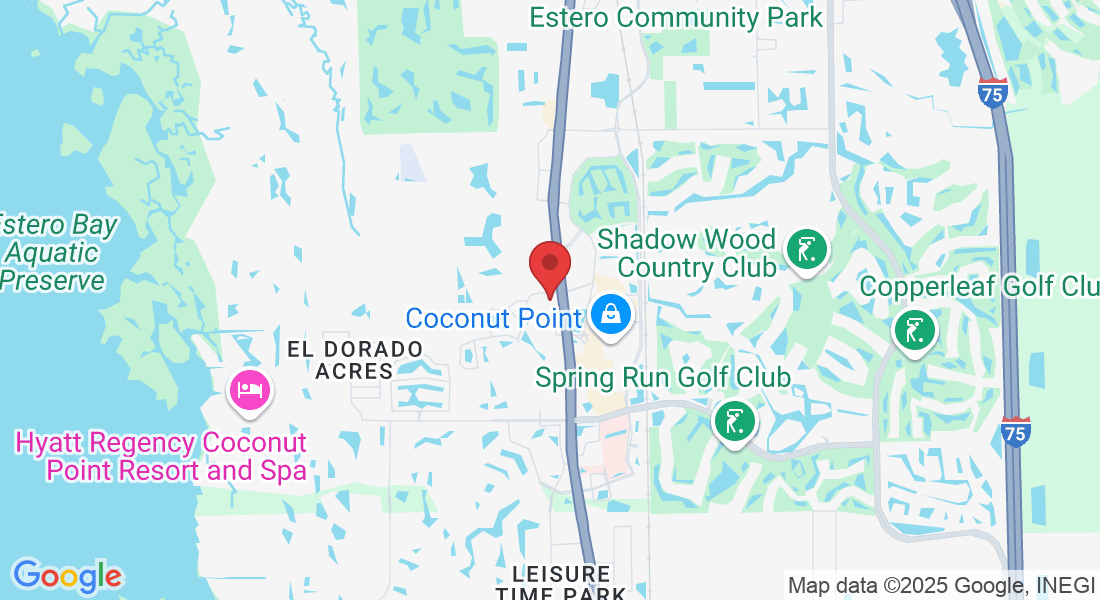Redefining Memory Care In Estero Florida
Choosing the right memory care community for a loved one is a deeply personal decision. At Gulf Coast Memory Care, nestled in the heart of Estero, Florida, we've created a haven of tranquility where residents can experience a luxurious and comfortable lifestyle. Let us help you make this important decision with confidence.
"Choose us with peace of mind; if within 90 days your heart pulls you elsewhere, we'll ensure a smooth transition and give your community fee back to help secure another place."
Your family's freedom to thrive is our top priority.

Understanding The Benefits Of Memory Care
Hear From Benita
Watch the heartfelt moment when Benita's engineer husband confidently declared, "This is the place!" It was here that Benita found the ideal environment for her mother to receive the nurturing care and robust support she truly deserved.
We believe you'll resonate with their story and feel just as confident in our ability to provide exceptional care.
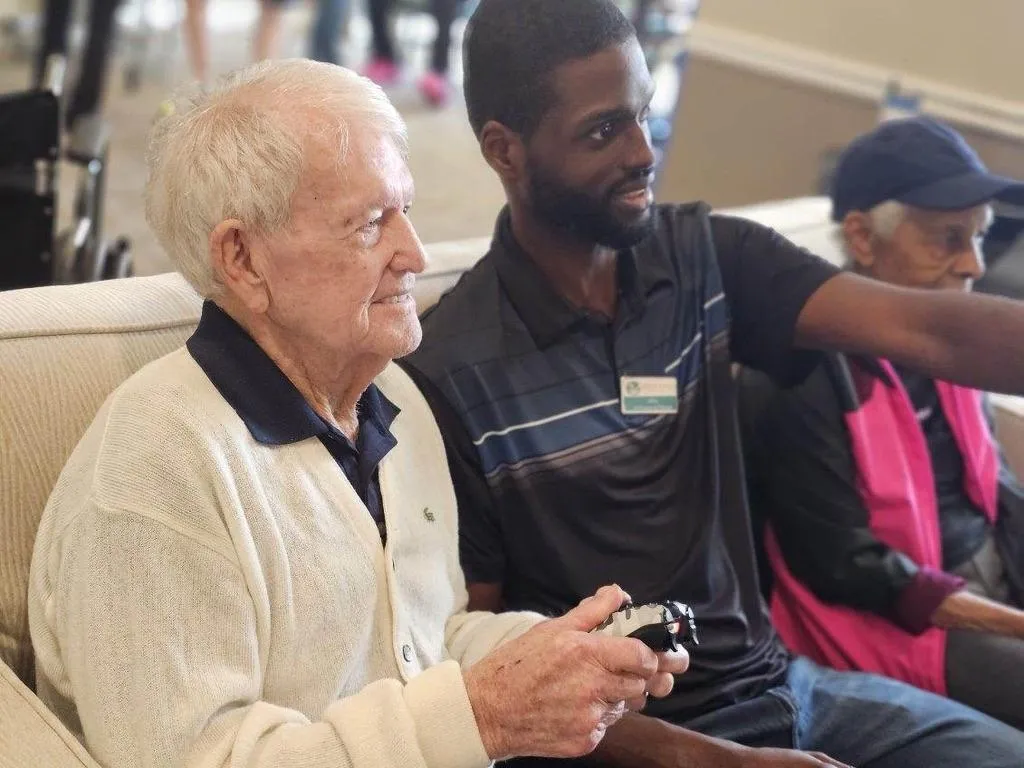
Is It The Right Time For Memory Care?
Understanding that memory care is not a one-size-fits-all solution, we prioritize personalized care plans that adapt to each individual’s progression.
Learn more about memory care and get personalized results in this quick 5 minute survey.

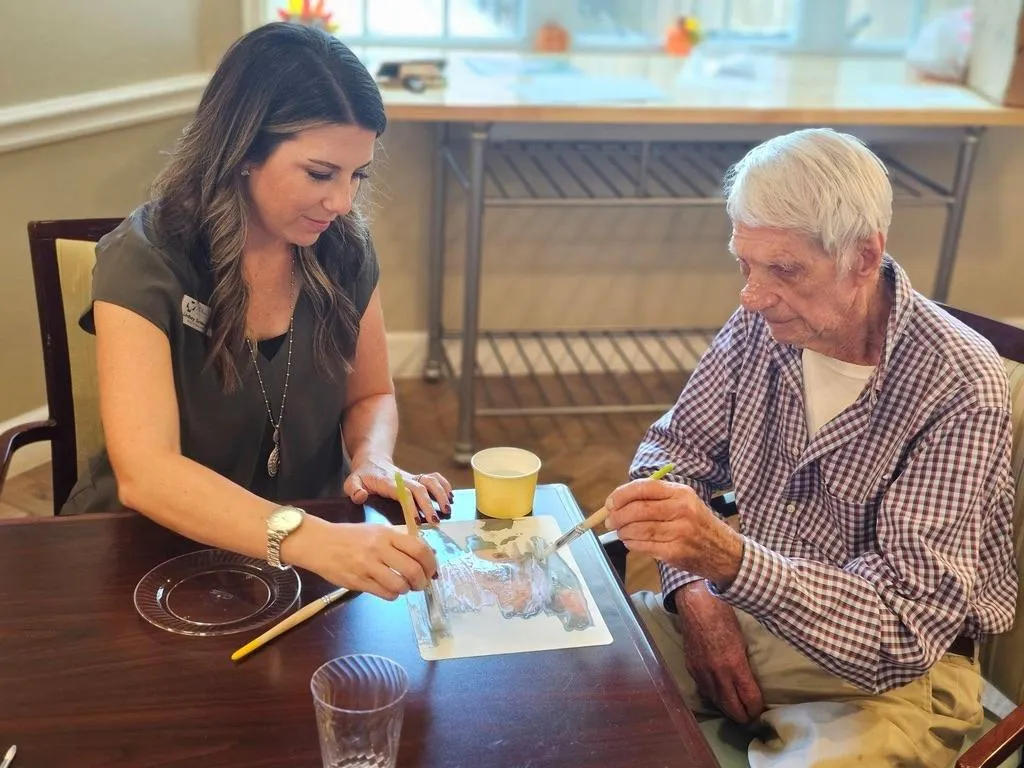
A Community For Alzheimer’s & Dementia Care
Families seeking Alzheimer’s and dementia support in Estero, Florida, can rely on our compassionate team for a community that truly cares.
Through ongoing training in the latest memory care practices and a commitment to safety, Gulf Coast Memory Care offers peace of mind for families and the highest standard of care for residents.
Love From Our Families


My mom moved into her new home a few weeks ago. I was able to visit with her this week while being in Florida and my gosh, I know she is right where she needs to be. Huge shoutout to Jerry, Diana, Paula, Kathy and Apryl. You are real life angels. The energy you bring is above and beyond. To see how you interact with not only my mom, but all the residents, it truly warms my heart. While it is heartbreaking to see my mom battle Alzheimer's, I know she is in the perfect place. She is safe and receiving the care she needs. <3 The place is clean, accommodating and most importantly feels like home. I love that there is a schedule and many activities for the residents to participate in. My mom has loved the painting and coloring
- Bill & Bonny B


Upon entering this beautiful community, I was deeply impressed by the exceptional level of care and compassion demonstrated by all the caregivers. Every member of the team, from maintenance staff to the executive director, significantly contributes to the residents' quality of life. The interior courtyards offer a safe and beautiful outdoor escape for the residents, while the dining area is both elegant and spacious. GCMC stands out as one of the premier memory care centers I have ever visited.
- Bill & Bonny B


Exceptional dedication. Genuine care 24/7, everyone is doing a great job, from Management to the care team. Jerry and Diana are conducting the business, but you can see them walking the hallway and chatting with the residents, literally knowing everyone. There is an engine who works behind the scenes to have the day and night activity running smoothly. Family feeling, warmth, and genuine care, overall, 5 stars. Residents are never alone, there is always a pair of eyes to watch and hands ready to help as needed, but all is done in a certain way, so our loved ones don’t feel any loss of their independence. Beautifully done. The activities are not just lines on paper, everyone is involved. Food is first class.
- Bill & Bonny B
Our Senior Care Amenities
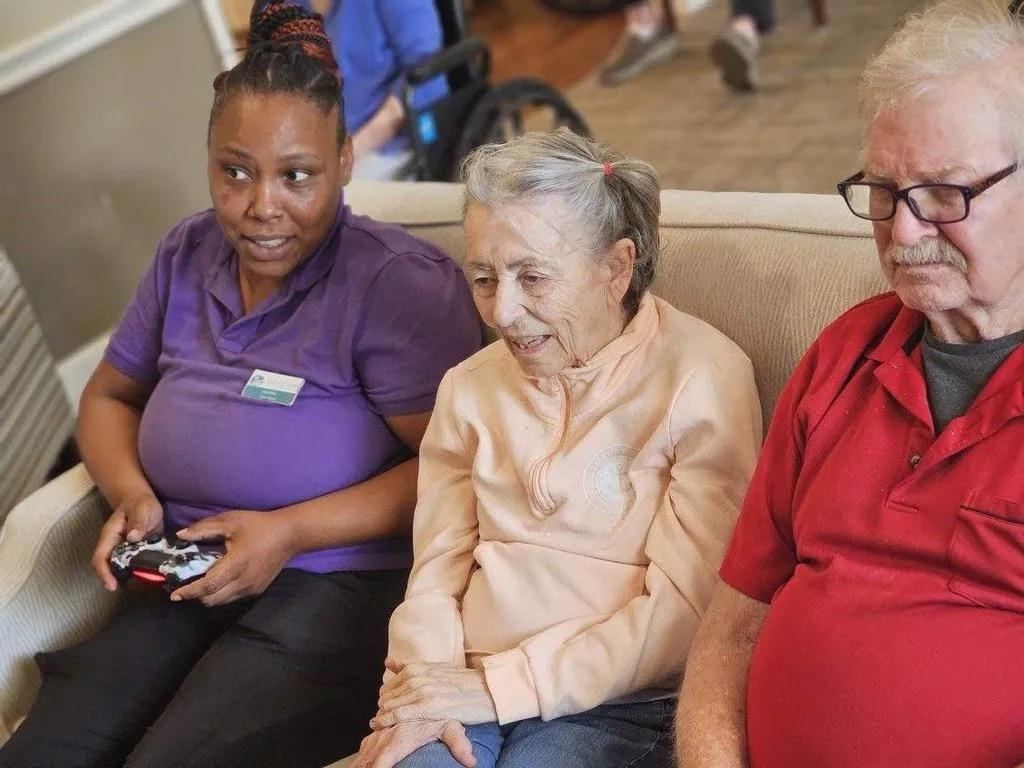
One-site beauty salon and barbershop
Personalized, chef-prepared meals
Customized activity programs
Craft and hobby room
Family living room
Full Library
Abundant natural light to minimize sundowning
Located next to Coconut Point Shopping Center
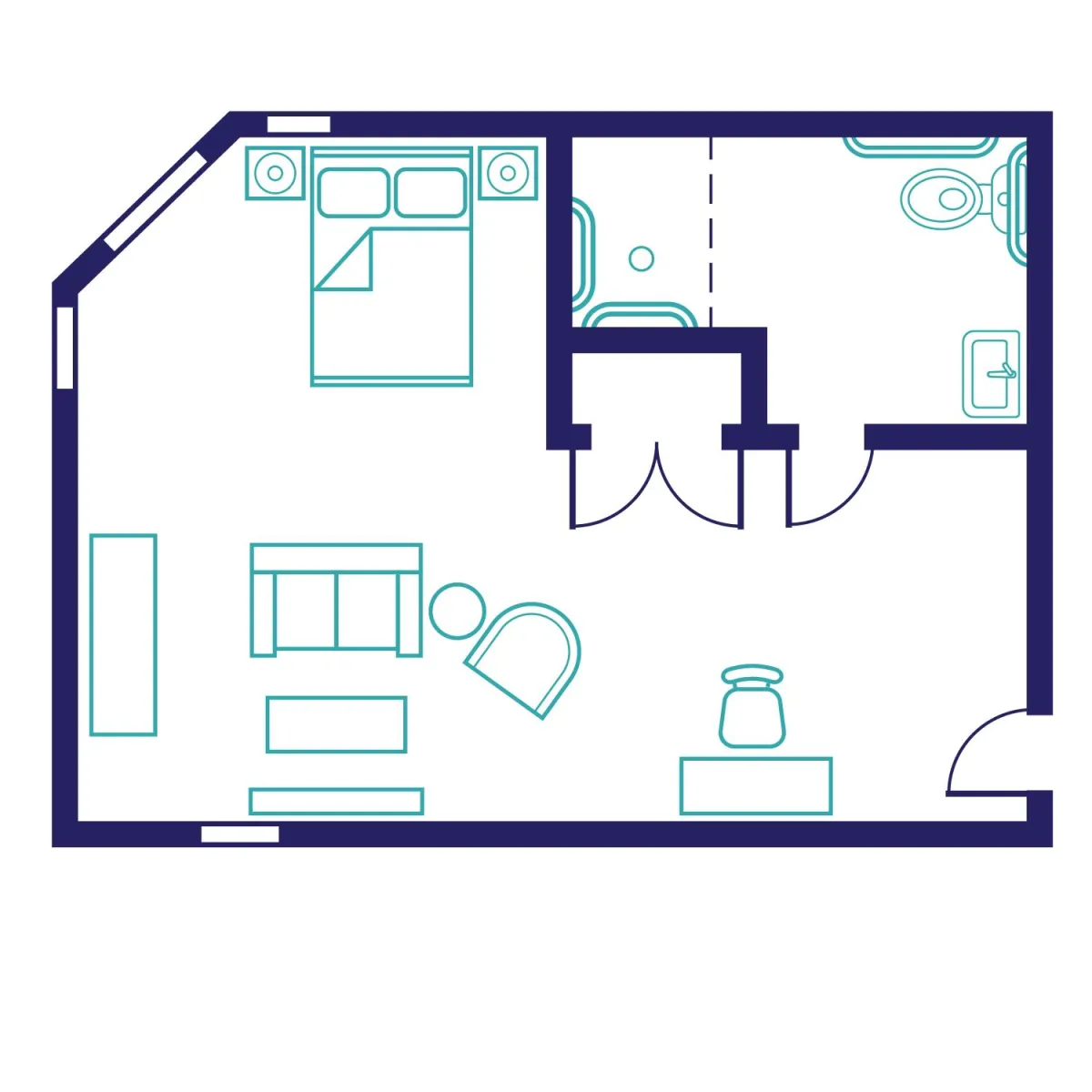
The Edison Suite
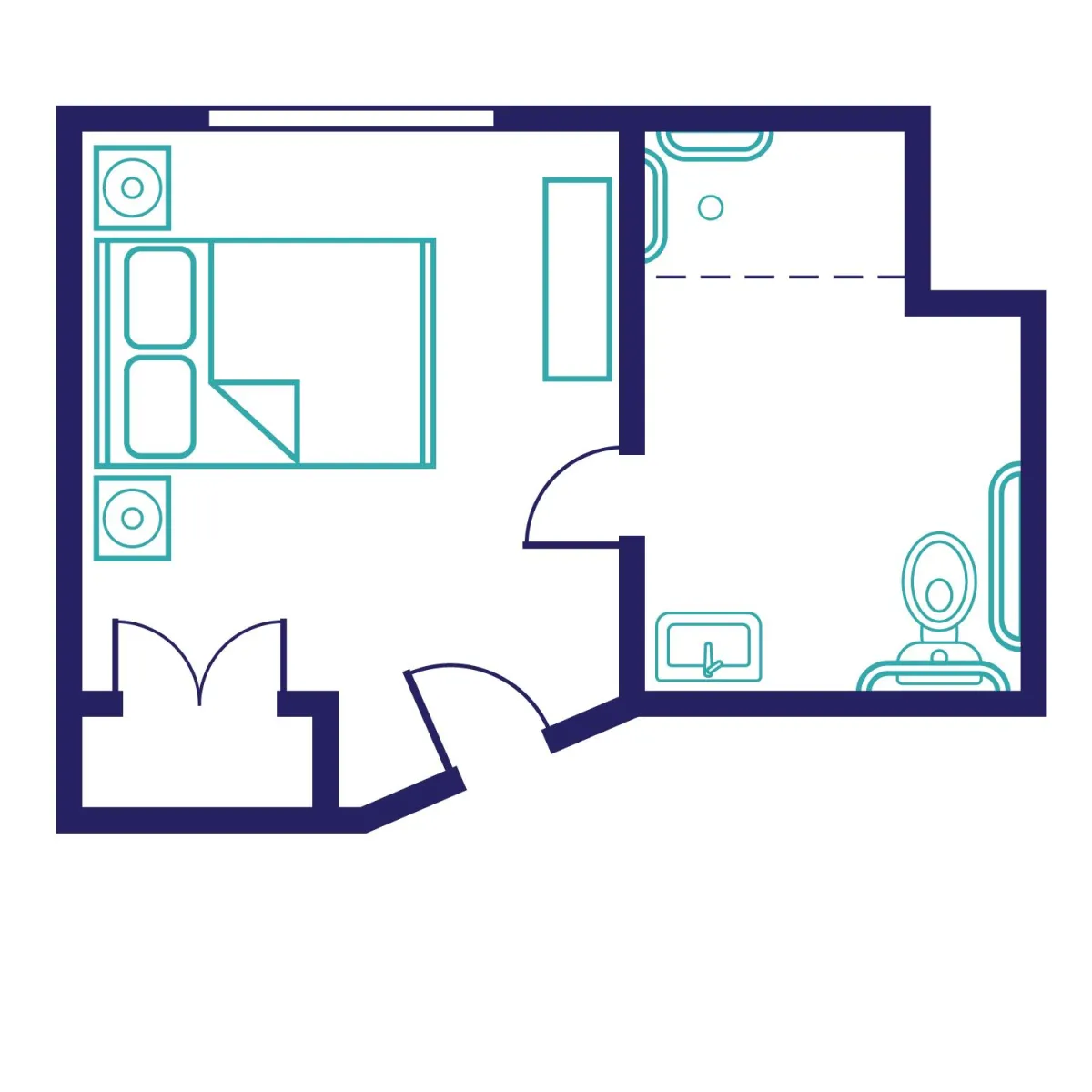
The Magnolia Suite
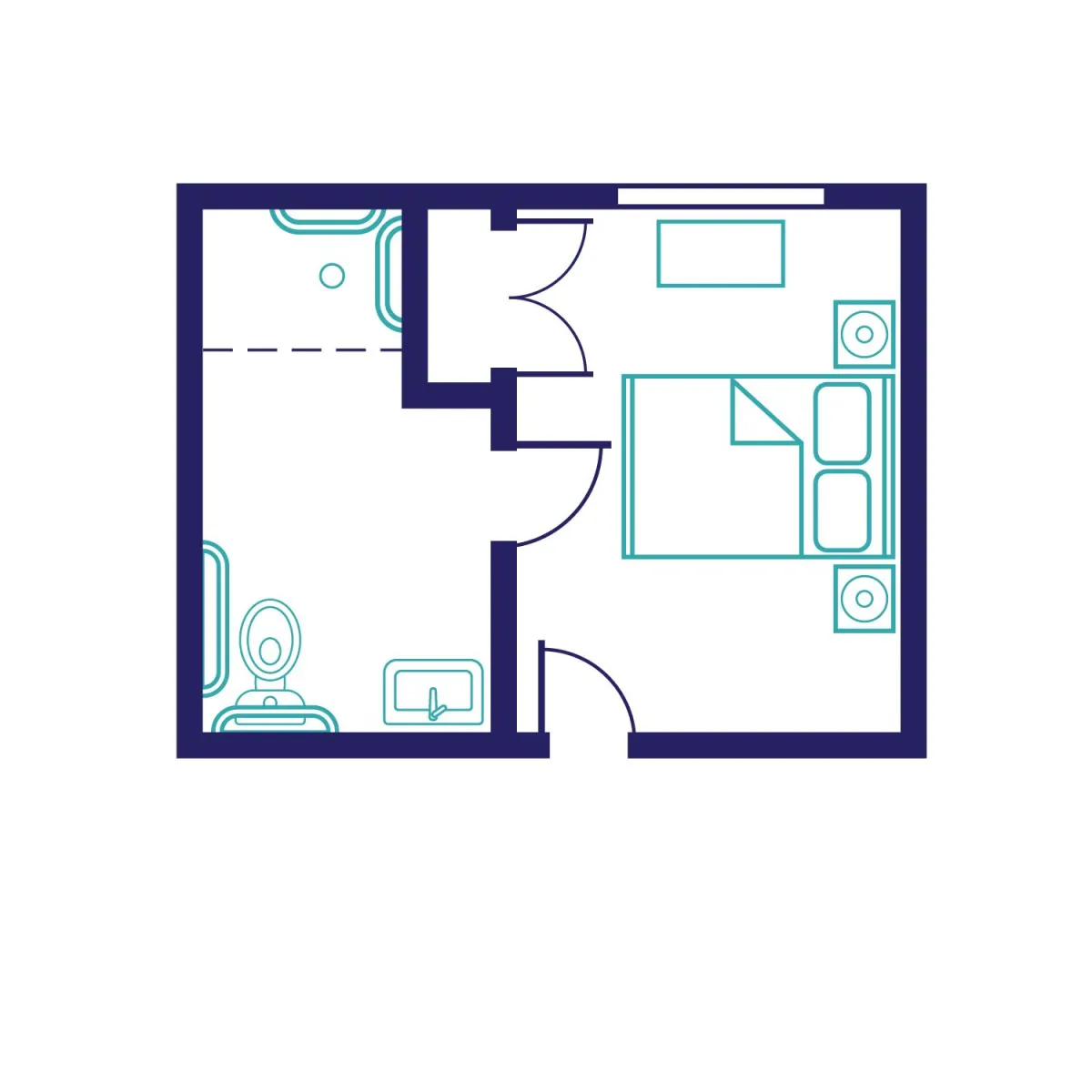
The Sugarberry Suite
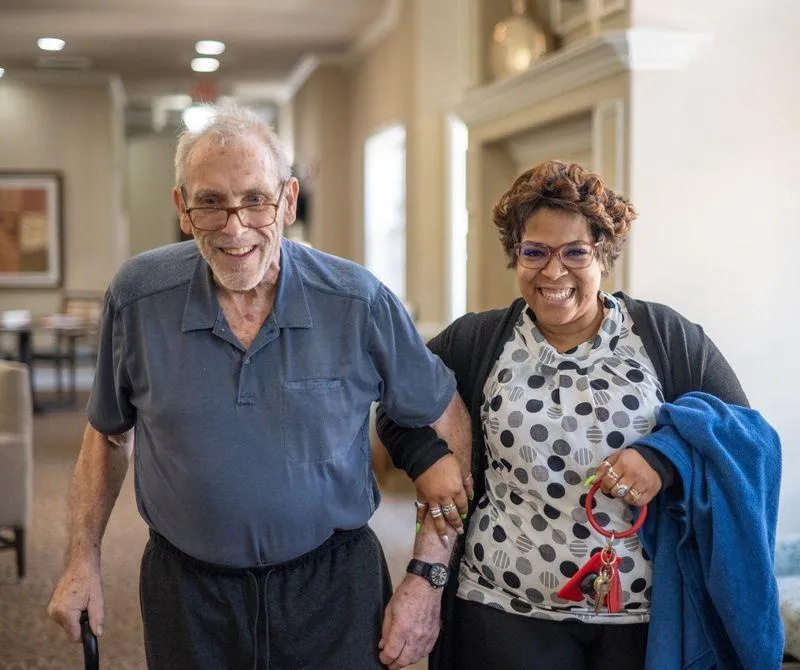
Engaging Residents With Meaningful Social Connections
We also prioritize activities that nurture both physical and mental wellness, from gentle exercise routines to social events that create a sense of community among residents. These carefully crafted programs are designed to boost mood, reduce anxiety, and encourage meaningful interactions, all of which contribute to a fulfilling lifestyle for those facing memory challenges.
Our Commitment To You
Our commitment extends to providing families with guidance and resources to understand memory loss and navigate the journey with confidence. Whether it’s through educational workshops or one-on-one consultations, we’re here to support families every step of the way, ensuring they feel connected and informed about their loved one’s care journey.

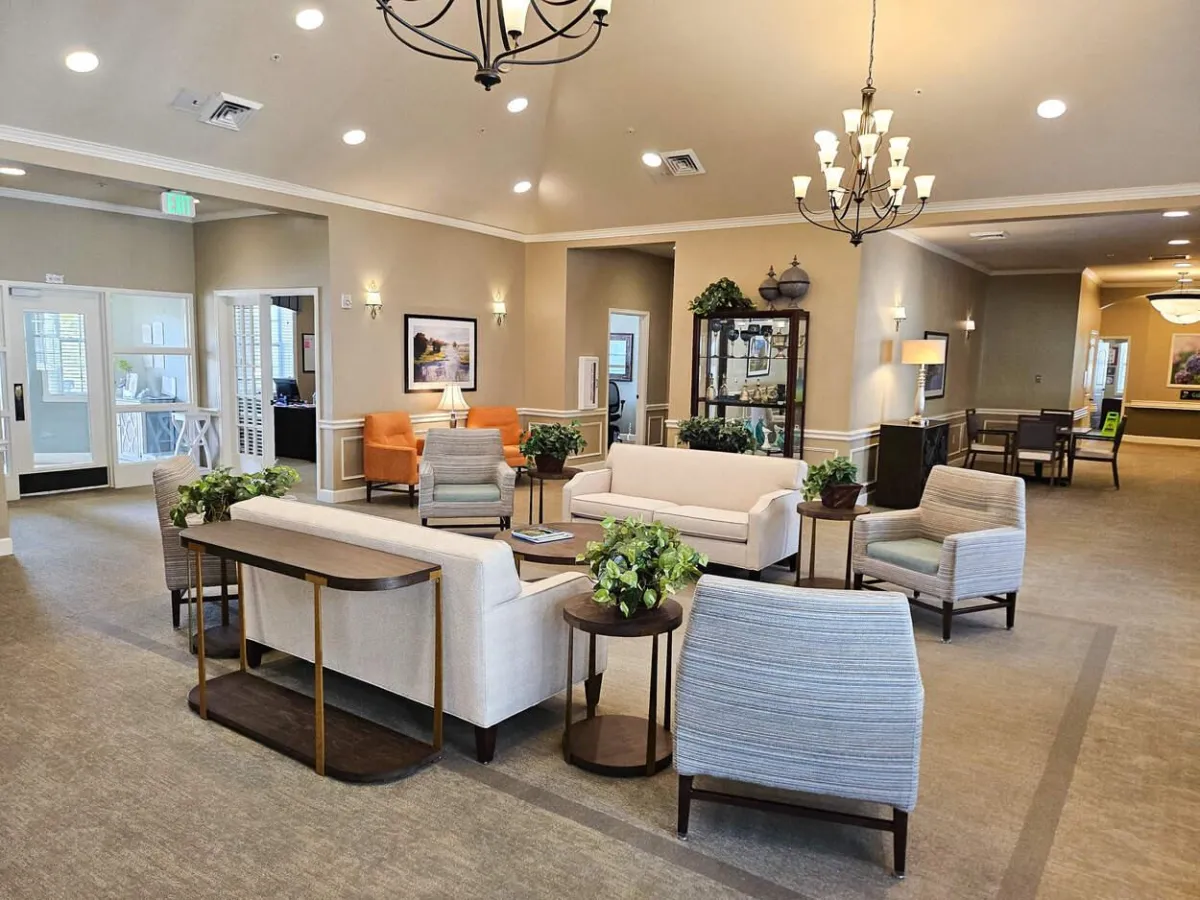
Are You Ready To Get Settled In?
Embark on a transformative experience at Gulf Coast Memory Care in Estero, Florida. We're not just a memory care community; we're a sanctuary where the mind, body, and spirit are nurtured. If you're seeking a place where compassion, care, and a deep respect for the human soul are paramount, you've found the right haven.

Memory Care vs Assisted Living: What's Right for Your Loved One?
Choosing the right care for an aging loved one can be a daunting task. Especially when they're dealing with memory issues or need help with daily activities.
Two popular options are memory care and assisted living. But what's the difference?
Memory care offers specialized support for individuals with memory impairments. It's designed to reduce confusion and enhance the quality of life for residents with conditions like dementia or Alzheimer's.
On the other hand, assisted living provides assistance to seniors who need help with daily activities. These communities offer services like meal preparation, medication management, and housekeeping.
This article will delve into the differences between these two types of care. We want to help you make an informed decision about what's best for your loved one.
Understanding the Basics: Memory Care and Assisted Living Defined
It's essential to understand memory care and assisted living before deciding on the right option. Each provides unique services tailored to different needs.
Memory care communities focus on individuals with memory impairments like dementia and Alzheimer's. These communities create a secure environment for residents to feel safe and cared for.
Memory care features include:
Structured daily routines
Specially trained staff
Enhanced safety measures
Programs to manage memory loss
Assisted living, however, caters to seniors needing support with daily living. These communities offer a balance of independence and assistance. Residents can enjoy social activities while receiving help with tasks like bathing and dressing.
Both types of care prioritize the well-being and happiness of their residents. Yet, they differ in the level of care and specialization provided. Understanding these distinctions is key to making the best choice.
By examining their specific features, you can determine which setting aligns with your loved one's needs. There are many options for elder care, and knowing the basics helps in the decision-making process.
The Unique Needs of Memory Care Residents
Memory care residents often face distinct challenges due to cognitive decline. These individuals require specialized care tailored to address memory-related issues.
Residents benefit from a structured environment that reduces confusion. Predictable daily routines help ease anxiety and improve the quality of life.
Safety is a critical concern for those in memory care. Secure premises prevent wandering, a common behavior in residents with dementia or Alzheimer's. This ensures their well-being and provides peace of mind for family members.
Emotional and psychological support is vital. Memory care staff engage residents in activities that foster connection and stimulate the mind. These activities, often designed specifically for memory care, play an important role in maintaining residents' emotional health.
Memory care also supports behavior management. Staff are trained to handle challenging behaviors compassionately, offering a nurturing environment for residents. These aspects make memory care a crucial choice for many families.
Services and Support in Assisted Living Communities
Assisted living communities offer a range of services to support seniors. These services cater to individuals who need help with daily tasks but maintain some independence. Common services include meal preparation and housekeeping, making life more manageable for residents.
Medication management is another key service provided. Trained staff ensure timely distribution of medications, reducing the risk of errors. This assistance is crucial for seniors managing multiple prescriptions. It gives families confidence that their loved ones are well taken care of.
Social engagement is encouraged through various activities and programs. Assisted living communities offer recreational and educational opportunities. These activities foster social connections and contribute to residents’ overall well-being. A vibrant social life is an essential aspect of life in these communities.
Comparing Staff Training and Expertise
In senior memory care, staff receive specialized training to address the unique needs of residents with memory impairments. This training includes techniques for managing dementia-related behaviors. It focuses on enhancing communication skills vital for residents' well-being.
Assisted living communities also prioritize staff training but with a broader focus. Staff are trained to assist with daily living activities and to monitor seniors’ general health. Their expertise ensures that residents receive the right level of support.
Differences in training highlight the distinct roles of staff in these environments. Memory care emphasizes specialized knowledge for cognitive issues, while assisted living covers a wider range of supportive care needs. Both are crucial for quality elder care.
Design and Safety: Tailoring Environments for Seniors
Design and safety are crucial in senior living communities. Memory care communities are designed specifically for individuals with cognitive impairments. These environments use calming colors and clear signage to reduce confusion.
Safety is a top priority in memory care. Communities incorporate secured entrances and exits to prevent wandering. They often feature enclosed outdoor spaces to allow safe exploration for residents.
Assisted living communities focus on providing comfortable and accessible living spaces. These environments are tailored to support varying mobility levels and encourage independence. Safety features include grab bars, emergency call systems, and slip-resistant flooring.
Key design and safety features in senior living include:
Secured entrances and exits for memory care.
Calming colors and clear signage in memory care settings.
Grab bars and emergency systems in assisted living.
Enclosed outdoor spaces in memory care communities.
Both types of care prioritize safety and comfort, ensuring a supportive environment for all residents.
Legal and Regulatory Aspects in Florida
Regulations for memory care and assisted living communities in Florida ensure resident safety and care quality. The state monitors compliance through regular inspections and licensing requirements. Each community must adhere to these standards to operate legally.
Memory care communities require additional certifications due to the specialized nature of their services. Staff need specific training to handle dementia-related challenges. Florida law mandates these requirements to protect vulnerable residents.
Before choosing a community, review its compliance history and any state reports available. A community with a good track record and clear adherence to regulations reflects a commitment to quality care. Being informed about these aspects ensures peace of mind for families.
Lifestyle and Community: Social and Recreational Activities
A vibrant lifestyle and community engagement can greatly enhance senior living. Assisted living communities in Florida often offer a robust array of social and recreational activities. These activities are designed to foster interaction, enjoyment, and a sense of belonging.
Residents can participate in group exercises, arts and crafts, and music sessions. Such programs not only enhance physical health but also promote cognitive engagement.
Memory care communities emphasize structured activities, tailored to individuals with memory impairments. These activities help stimulate memory, reduce anxiety, and improve overall quality of life. Engaging residents in familiar routines can bring comfort and joy. Socialization through community events is key to maintaining emotional well-being.
Choosing a housing option that values community and offers diverse programs is crucial. It ensures your loved one remains active, connected, and fulfilled. Activities that resonate with their interests can transform their experience and add meaning to daily life.
Evaluating and Choosing the Right Community in Florida
Choosing the right community in Florida requires diligent research. Start by considering your loved one’s specific needs and preferences. Visit multiple communities to get a sense of the environment and amenities.
Pay attention to the staff-to-resident ratio in each community. A lower ratio often means more personalized attention. Inquire about staff training, especially concerning memory care techniques.
Location is also a key factor. Proximity to family and friends can improve the quality of life for residents. Additionally, consider the local climate and access to health care services.
Always check the community’s licensing and accreditation status. Reading reviews and speaking with current residents' families can provide valuable insights. Taking these steps helps ensure a supportive and caring environment for your loved one.
Financial Assistance and Insurance Coverage for Senior Care
Paying for senior care can be a significant concern for families. Fortunately, various financial assistance options are available to ease the burden. Medicaid may cover some costs for eligible individuals in both memory care and assisted living settings.
Exploring insurance options is also crucial. Long-term care insurance policies might cover a portion of the expenses associated with elder care. Investigating what each policy offers will provide clarity on the available benefits.
It's wise to meet with a financial advisor to understand all available resources. They can help identify government programs or veterans’ benefits that might apply. Taking time to assess these options can offer peace of mind and financial relief.
Conclusion: Making an Informed Decision for Your Loved One
Choosing between memory care and assisted living is a personal decision. It's crucial to consider the unique needs of your loved one. Each option offers distinct advantages and levels of support.
Visiting communities and talking to staff can provide valuable insight. Take time to observe the environment and ask questions about care approaches. This step is vital in finding a good fit for your loved one's needs.
Discuss the decision with family members to ensure everyone is aligned. Making an informed choice helps ensure a comforting and supportive environment for your loved one.

Memory Care vs Assisted Living: What's Right for Your Loved One?
Choosing the right care for an aging loved one can be a daunting task. Especially when they're dealing with memory issues or need help with daily activities.
Two popular options are memory care and assisted living. But what's the difference?
Memory care offers specialized support for individuals with memory impairments. It's designed to reduce confusion and enhance the quality of life for residents with conditions like dementia or Alzheimer's.
On the other hand, assisted living provides assistance to seniors who need help with daily activities. These communities offer services like meal preparation, medication management, and housekeeping.
This article will delve into the differences between these two types of care. We want to help you make an informed decision about what's best for your loved one.
Understanding the Basics: Memory Care and Assisted Living Defined
It's essential to understand memory care and assisted living before deciding on the right option. Each provides unique services tailored to different needs.
Memory care communities focus on individuals with memory impairments like dementia and Alzheimer's. These communities create a secure environment for residents to feel safe and cared for.
Memory care features include:
Structured daily routines
Specially trained staff
Enhanced safety measures
Programs to manage memory loss
Assisted living, however, caters to seniors needing support with daily living. These communities offer a balance of independence and assistance. Residents can enjoy social activities while receiving help with tasks like bathing and dressing.
Both types of care prioritize the well-being and happiness of their residents. Yet, they differ in the level of care and specialization provided. Understanding these distinctions is key to making the best choice.
By examining their specific features, you can determine which setting aligns with your loved one's needs. There are many options for elder care, and knowing the basics helps in the decision-making process.
The Unique Needs of Memory Care Residents
Memory care residents often face distinct challenges due to cognitive decline. These individuals require specialized care tailored to address memory-related issues.
Residents benefit from a structured environment that reduces confusion. Predictable daily routines help ease anxiety and improve the quality of life.
Safety is a critical concern for those in memory care. Secure premises prevent wandering, a common behavior in residents with dementia or Alzheimer's. This ensures their well-being and provides peace of mind for family members.
Emotional and psychological support is vital. Memory care staff engage residents in activities that foster connection and stimulate the mind. These activities, often designed specifically for memory care, play an important role in maintaining residents' emotional health.
Memory care also supports behavior management. Staff are trained to handle challenging behaviors compassionately, offering a nurturing environment for residents. These aspects make memory care a crucial choice for many families.
Services and Support in Assisted Living Communities
Assisted living communities offer a range of services to support seniors. These services cater to individuals who need help with daily tasks but maintain some independence. Common services include meal preparation and housekeeping, making life more manageable for residents.
Medication management is another key service provided. Trained staff ensure timely distribution of medications, reducing the risk of errors. This assistance is crucial for seniors managing multiple prescriptions. It gives families confidence that their loved ones are well taken care of.
Social engagement is encouraged through various activities and programs. Assisted living communities offer recreational and educational opportunities. These activities foster social connections and contribute to residents’ overall well-being. A vibrant social life is an essential aspect of life in these communities.
Comparing Staff Training and Expertise
In senior memory care, staff receive specialized training to address the unique needs of residents with memory impairments. This training includes techniques for managing dementia-related behaviors. It focuses on enhancing communication skills vital for residents' well-being.
Assisted living communities also prioritize staff training but with a broader focus. Staff are trained to assist with daily living activities and to monitor seniors’ general health. Their expertise ensures that residents receive the right level of support.
Differences in training highlight the distinct roles of staff in these environments. Memory care emphasizes specialized knowledge for cognitive issues, while assisted living covers a wider range of supportive care needs. Both are crucial for quality elder care.
Design and Safety: Tailoring Environments for Seniors
Design and safety are crucial in senior living communities. Memory care communities are designed specifically for individuals with cognitive impairments. These environments use calming colors and clear signage to reduce confusion.
Safety is a top priority in memory care. Communities incorporate secured entrances and exits to prevent wandering. They often feature enclosed outdoor spaces to allow safe exploration for residents.
Assisted living communities focus on providing comfortable and accessible living spaces. These environments are tailored to support varying mobility levels and encourage independence. Safety features include grab bars, emergency call systems, and slip-resistant flooring.
Key design and safety features in senior living include:
Secured entrances and exits for memory care.
Calming colors and clear signage in memory care settings.
Grab bars and emergency systems in assisted living.
Enclosed outdoor spaces in memory care communities.
Both types of care prioritize safety and comfort, ensuring a supportive environment for all residents.
Legal and Regulatory Aspects in Florida
Regulations for memory care and assisted living communities in Florida ensure resident safety and care quality. The state monitors compliance through regular inspections and licensing requirements. Each community must adhere to these standards to operate legally.
Memory care communities require additional certifications due to the specialized nature of their services. Staff need specific training to handle dementia-related challenges. Florida law mandates these requirements to protect vulnerable residents.
Before choosing a community, review its compliance history and any state reports available. A community with a good track record and clear adherence to regulations reflects a commitment to quality care. Being informed about these aspects ensures peace of mind for families.
Lifestyle and Community: Social and Recreational Activities
A vibrant lifestyle and community engagement can greatly enhance senior living. Assisted living communities in Florida often offer a robust array of social and recreational activities. These activities are designed to foster interaction, enjoyment, and a sense of belonging.
Residents can participate in group exercises, arts and crafts, and music sessions. Such programs not only enhance physical health but also promote cognitive engagement.
Memory care communities emphasize structured activities, tailored to individuals with memory impairments. These activities help stimulate memory, reduce anxiety, and improve overall quality of life. Engaging residents in familiar routines can bring comfort and joy. Socialization through community events is key to maintaining emotional well-being.
Choosing a housing option that values community and offers diverse programs is crucial. It ensures your loved one remains active, connected, and fulfilled. Activities that resonate with their interests can transform their experience and add meaning to daily life.
Evaluating and Choosing the Right Community in Florida
Choosing the right community in Florida requires diligent research. Start by considering your loved one’s specific needs and preferences. Visit multiple communities to get a sense of the environment and amenities.
Pay attention to the staff-to-resident ratio in each community. A lower ratio often means more personalized attention. Inquire about staff training, especially concerning memory care techniques.
Location is also a key factor. Proximity to family and friends can improve the quality of life for residents. Additionally, consider the local climate and access to health care services.
Always check the community’s licensing and accreditation status. Reading reviews and speaking with current residents' families can provide valuable insights. Taking these steps helps ensure a supportive and caring environment for your loved one.
Financial Assistance and Insurance Coverage for Senior Care
Paying for senior care can be a significant concern for families. Fortunately, various financial assistance options are available to ease the burden. Medicaid may cover some costs for eligible individuals in both memory care and assisted living settings.
Exploring insurance options is also crucial. Long-term care insurance policies might cover a portion of the expenses associated with elder care. Investigating what each policy offers will provide clarity on the available benefits.
It's wise to meet with a financial advisor to understand all available resources. They can help identify government programs or veterans’ benefits that might apply. Taking time to assess these options can offer peace of mind and financial relief.
Conclusion: Making an Informed Decision for Your Loved One
Choosing between memory care and assisted living is a personal decision. It's crucial to consider the unique needs of your loved one. Each option offers distinct advantages and levels of support.
Visiting communities and talking to staff can provide valuable insight. Take time to observe the environment and ask questions about care approaches. This step is vital in finding a good fit for your loved one's needs.
Discuss the decision with family members to ensure everyone is aligned. Making an informed choice helps ensure a comforting and supportive environment for your loved one.
Come Visit Us
We can't wait to hear from you! Fill out our contact form to get started or if you would like to see our community for yourself, schedule a tour here.
Gulf Coast Memory Care
(239) 221-6120
22900 Lyden Dr, Estero, FL 33928
AL# 12921

